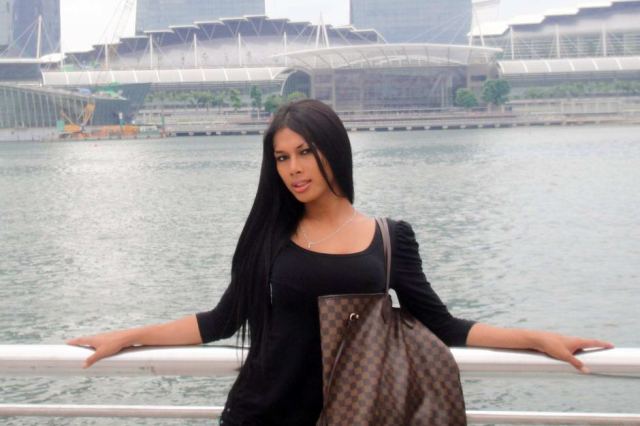feature image via shutterstock
I think if you ask just about any trans person what they fear the most, they’ll probably tell you that it’s violence. While the everyday worries of harassment alnd discrimination are probably more constant worries, the cold hard fact that I’m at much higher risk for violence simple by virtue of my gender identity is something that has weighed on me since I first came out. Most days I just try to put to the back of my mind. Sure, I’m still vigilant and aware of my surroundings, and I never leave home without my pepper spray. But if I allowed myself to dwell on reality of the situation, I’m pretty sure I’d never leave my house. A few months ago, I got a really nasty reminder of just how present those risks are when two trans women were shot just a few miles from where I live.
When I began to investigate that incident for Autostraddle, I was sickened and distraught at home much indignity those women suffered at the hands of the local media. Nearly every local news outlet that even bothered to cover the story (many didn’t) misgendered these women, referring to them as “transgender males” or “men dressed as women,” and worse yet, many of the reports heavily implied that these women were sex workers, despite police insistence that there was no evidence of that. One station went for far as to interview a cab driver who hinted that the women may have deserved to be attacked for being “deceptive.” The entire experience left me frustrated, sickened, and even more intensely aware of how little dignity trans women are afforded, even when they’re the victims of violence.
Those frustrations have come to a head again recently when the publicity surrounding the brutal murders of two more trans women, Mayang Prasetyo in Australia and Jennifer Laude in the Philippines. Prasetyo was mutilated by her husband nearly beyond recognition, and it is believed that Laude was murdered by a US Marine. Unfortunately, much of the news coverage following both of their deaths has treated them as headline-grabbing spectacles and little more than lurid clickbait, not as real, innocent human victims of anti-woman and anti-trans violence. The fact that violence against trans women is enacted overwhelmingly against trans women of color — 87% of LGBTQ murder victims in 2011 were people of color, and black trans women in particular experience incredible rates of violence — makes this trend particularly horrific.

Trans people aren’t exactly offered much in the way of dignity from the media when we’re alive. For decades, we were relegated to trashy daytime talk-shows and treated as little more than props for these lurid, disgusting spectacles. We were never presented as people, as beings with humanity, feelings, or agency of our own, only as punchlines for whatever joke was lowest-common-denominator flavor of the day. Only recently have trans people managed to find their way out of the daytime garbage and into the mainstream consciousness to some degree. Unfortunately, even as trans folks are interviewed by major news outlets or featured in popular TV shows or front tremendously successful bands, the news media still treats us as little more than spectacle. It’s rarely our humanity that’s being celebrated or highlighted in those moments.

Even as the media attempts to frame their vignettes on the “overcoming adversity” narrative that’s oh-so-commonly applied to trans people, it’s rarely our accomplishments, our warmth, our love, our beautiful lives, or even our personal anguish they’re highlighting. Instead, the focus almost unfailingly falls on our “otherness,” the things that set us apart from so much of the world. It’s about the “transformation” angle of our lives, often with photos or video of our pre-transition bodies. It’s about our surgeries (because they always assume there must have been surgeries). It’s about our dysphoria and the profound disconnect we have with physical shapes we were given at birth. In short, it’s the things that set us apart from the cissexual population that people are only ever interested in, and almost never the multitudes of things we experience just like any other person — like love, joy, accomplishment, community, pain, loss, and disappointment. We’re denied the chance to have others see us and connect with us on a fundamentally human level.
Of course, the moment a trans woman becomes the target of violence, all facade of guarding her humanity flies out the window, as the coverage of the attacks in Detroit clearly demonstrated. While women in general are often framed as complicit, or at least culpable, in their own victimization at the hands of violent offenders, trans women (and really, all trans people) endure this to an even harsher degree. Slut-shaming is a frequent occurrence — it will often be pointed out that they were dressed or acted “provocatively,” or somehow enticed their assailant. It feels like sometimes, simply being a trans woman — no matter how demurely one might dress or act — is seen as inherently “provocative.” Almost as frequently, the trope of trans-people-as-deceivers will be trotted out, and in that moment, we are transformed from victim to perpetrator. It will be said that those who assaulted us were victims of our “trickery,” and it will be implied that the violence we endured was deserved and justified. And there, in the recitation of that tired trope, the beautiful authentic lives we’ve carefully carved out for ourselves are transformed to artifice for all those who read or hear the media’s story. The apocryphal identities we’ve worked so hard to shed are forcibly pressed back upon us as they were at birth. In a few short lines of text or seconds of news story, we’re stripped of our dignity for the terrible crime of daring to be ourselves too close to someone who was made uncomfortable by it. And just as quickly, a seriously misogynistic and transmisogynistic crime becomes a justifiable action.
Even compared to the little dignity afforded to living trans persons, it’s even worse in death. A trans person who loses their life to transphobic violence often has her character just as brutally assaulted as those survive it. That’s particularly evident in the coverage of the deaths of Mayang Prasetyo and Jennifer Laude. Both women were referred to by anti-trans slurs throughout the media. Multiple reports have implied that Jennifer Maude was murdered because she “deceived” her murderer by simply being trans. The bulk of the coverage focused on the fact that these women were transgender, and treated the fact that were brutally murdered as a secondary, somewhat irrelevant factoid. Driving that point home were the number of pictures published of both women in bathing suits and lingerie. While publishing these kinds of photos of a cissexual woman who had been murdered would be distasteful, for trans women it becomes part of the show. Jennifer and Mayang became little more spectacles for driving clicks, and lost in that grab for internet eyeballs was the suffering and loss of these two beautiful young women.
Beyond the indignities of victim-blaming and slut-shaming, these women (and so many other murdered trans people) also had their identities tainted by constant dead-naming. (For those unfamiliar, dead-naming refers to revealing a trans person’s birth name without permission). Neither woman’s birth name was even remotely applicable to these stories (neither was any history, real or alleged, of sex work), and yet story after story insisted on adding these details. Dead-naming a murdered trans woman serves no practical purpose. It only adds to the spectacle by reinforcing her status as “other.” It robs her of her dignity, for the hope of added traffic and revenue. To use a trans person’s birth name after they’ve been murdered in an anti-trans hate crime undermines their identity and their agency in defining that identity on their own terms. Trans people go to great length, expense, and risk to live as their authentic selves. Dead-naming, in one fell swoop, declares “Sorry, but we know who you are better than you ever did.” Perhaps even more hideously, it erases the experience that cost them their lives. It’s yet another way to flip the narrative from a person killed for living as their authentic selves to a deception-gone-wrong.
Every time one of these ghoulish situations occurs, it stands as a reminder to trans people that we’re only human beings in eyes of society right up to the point where we can be clickbait — that our worth lies in how fascinated other people are by us. It’s a reminder that, for all of our progress over the last few years, we are still very much othered outsiders in most places, that we’re little more than curiosities at best. Worse yet, it serves as a strong deterrent for trans people to report violence committed against them. If reporting a hate-crime is going to bring the attention of the media and their inevitable slut-shaming and dead-naming, why would anyone go the police? Most disturbingly, it harms the safety of the transgender community. Because this treatment discourages the reporting of anti-trans hate crimes, those offenders are free to continue to assault, rape, and murder trans women with impunity. But, more importantly, the constant othering and denigrating of trans women in this fashion only makes it easier for people to harm us. It’s far easier to hurt someone you view as less than human, and the news media is still constantly reminding the world that we are just that: without humanity or dignity, even after death.







